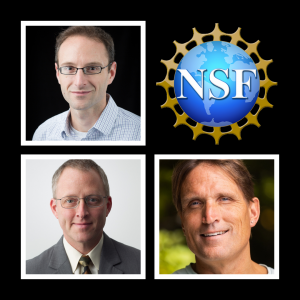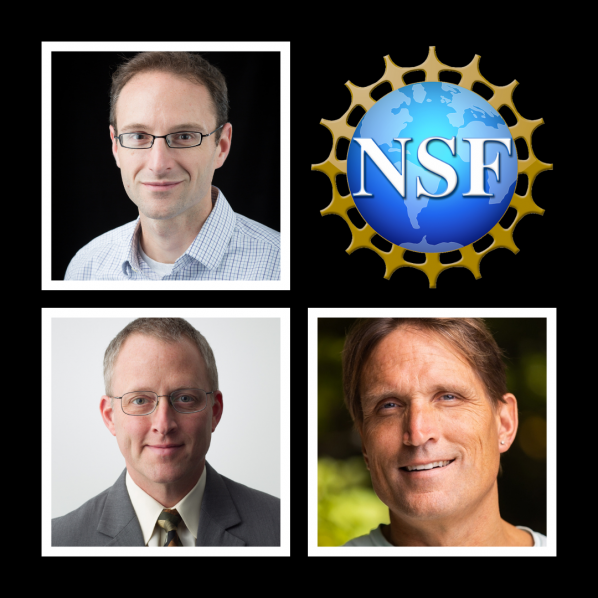BOONE, N.C. — A group of faculty members from the Appalachian State University College of Arts and Sciences has been awarded a three-year grant from the National Science Foundation (NSF) totaling over $530,000. The funding will support research at App State's Appalachian Atmospheric Interdisciplinary Research (AppalAIR) facility, and the Applied Fluids Laboratory will provide computational modeling support.
The interdisciplinary project, titled "MRI Track 1: Acquisition of an Aerosol Chemical Speciation System to Elucidate Sources, Formation Processes, and Environmental Impacts at ASU's AppalAIR Observatory," is funded by NSF's Major Research Instrumentation Program (MRI) and supports the development of an Aerosol Chemical Speciation System (ACSS) at AppalAIR.
Dr. Robert Swarthout, associate professor in the Department of Chemistry and Fermentation Sciences and Department of Geological and Environmental Sciences, is the principal investigator on the project. Department of Physics and Astronomy professors Dr. Chris Thaxton and Dr. James Sherman serve as co-investigators.
AppalAIR was initiated in 2009 to better understand changing regional meteorology and air quality and their impacts on climate change and ecosystem health. Atmospheric aerosols—observed as haze, smoke, and dust—modify earth’s energy budget directly by scattering and absorbing incident sunlight and indirectly by serving as seeds for cloud droplets. Aerosol indirect and direct effects on radiation are the largest uncertainties in climate forcing, according to the latest Intergovernmental Panel on Climate Change Assessment Report (IPCC AR6 in 2021). In addition to their impacts on climate, aerosols are criteria air pollutants regulated by the Environmental Protection Agency because of their potential effects on respiratory health.
The AppalAIR facilities at App State are home to the only co-located National Oceanic and Atmospheric Administration (NOAA) Global Monitoring Division, National Aeronautics and Space Administration (NASA) AErosol RObotic NETwork (AERONET), and NASA Micro-Pulsed Lidar NETwork (MPLNET) aerosol monitoring sites in the country, along with co-located measurements of clouds and solar radiation and a meteorological station.
Aerosol data from AppalAIR have been used in several global studies, including IPCC AR6. The ACSS collects detailed aerosol chemical composition measurements that will be used to better understand how pollution from various aerosol sources and smoke from wildfires are modifying the chemical composition of aerosols. These chemical measurements, along with measurements of aerosol size, their ability to accumulate water vapor, and their ability to modify cloud properties, will be used to assess the link between chemical composition and climate and human health impacts.
In 2024, the ACSS will be used in two large, collaborative NSF-funded field campaigns between App State, Georgia Tech, and NOAA to study aerosol water uptake and aerosol-cloud interactions. Additionally, the ACSS will enable App State to compare measurements from AppalAIR to those at the NSF-funded Addressing Systems Challenges Through Engineering Teams (ASCENT) network of sites across the United States, which study aerosol chemistry, size distributions, and sources.
Currently, three App State physics students are contributing to the project:
Ethan Barber '22, engineering physics graduate student from Durham
Shawn Beekman '22, engineering physics graduate student from Cary
Mason Fuller, junior physics major from Colfax
In the future, additional undergraduate and graduate students will have the opportunity to contribute to the ACSS-enabled projects, providing them with an advantage when entering the job market or seeking advanced degrees.
###
About the A.R. Smith Department of Chemistry and Fermentation Sciences
The A.R. Smith Department of Chemistry and Fermentation Sciences offers a Bachelor of Arts in chemistry, a Bachelor of Science in chemistry with eight different concentrations and an interdisciplinary Bachelor of Science degree in fermentation sciences. The department’s programs prepare students to attend graduate and professional schools, as well as for employment in the pharmaceutical and fermentation industries and other business sectors. Learn more at https://dcfs.appstate.edu.
About the Department of Geological and Environmental Sciences
Located in Western North Carolina, Appalachian State University provides the perfect setting to study geological and environmental sciences. The Department of Geological and Environmental Sciences provides students with a solid foundation on which to prepare for graduate school or build successful careers as scientists, consultants and secondary education teachers. The department offers six degree options in geology and two degree options in environmental science. Learn more at https://earth.appstate.edu.
About the Department of Physics and Astronomy
The Department of Physics and Astronomy’s curriculum has an applied nature that includes a core of fundamental physics courses and laboratory experiences. The department prepares graduates for a variety of scientific, teaching or engineering professions, as well as future educational endeavors. Learn more at https://physics.appstate.edu.
By Lauren Andersen
September 25, 2023
BOONE, N.C.

